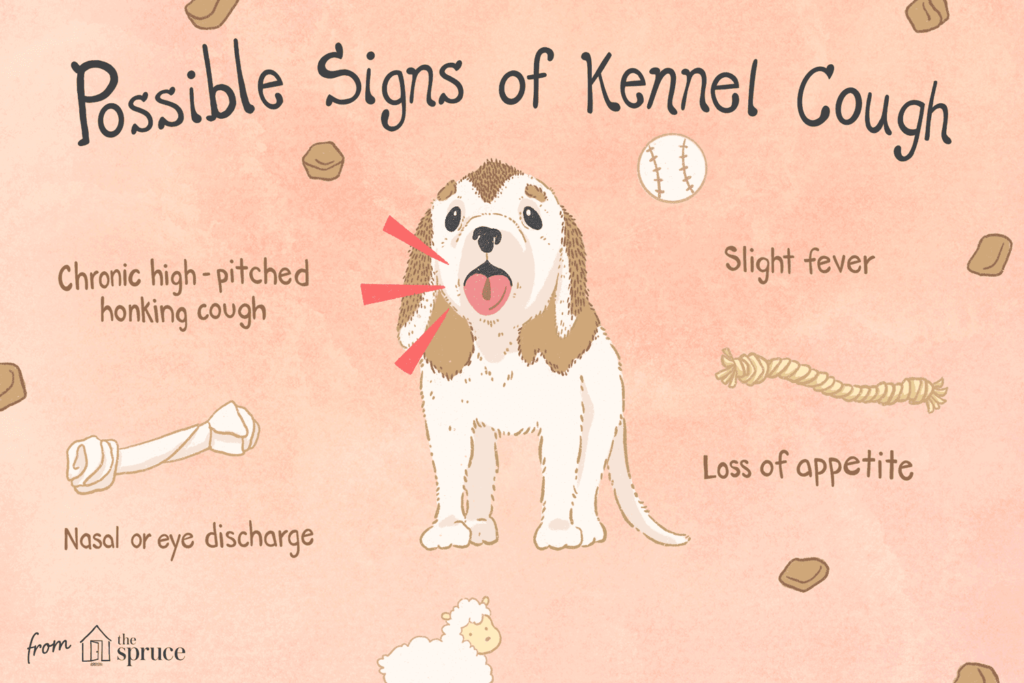
Kennel Cough
Kennel cough! Yikes! No one wants to hear that diagnosis. Kennel cough is highly contagious and its classic honking cough can linger for weeks. Your sick pooch will have to be isolated. Doggy daycare and the dog park will need to be put on hold. Fortunately, most kennel cough infections are mild and the disruption of your normal daily routine is temporary.
So what is kennel cough? The name kennel cough is a general term for Canine Infectious Tracheobronchitis. There are multiple viruses and bacteria that can cause kennel cough. Bordetella bronchiseptica is the bacteria associated with the majority of cases. It may be the only pathogen (disease-causing microorganism) involved or more commonly, one of a combination of pathogens.
Kennel cough was so named because it is often acquired by dogs in group housing situations such as shelters or boarding facilities. It is easily transmitted through secretions of the nose and mouth. This can be through direct nose-to-nose contact, by breathing in aerosolized droplets or by contact with contaminated objects such as beds, water bowls, and toys. It is the close quarters that allow one sick dog to infect many others. It is also the compromised immune system resulting from stress in shelters and boarding kennels that enables the disease to spread easily.
Infected dogs will break with a cough within 2 to 14 days of exposure. Most cases are mild involving only a cough. The cough is typically dry but can be moist. It is often a powerful, persistent cough that worsens with exercise. It may be accompanied by a high-pitched honking sound. Some patients will also have other signs of illness. Ocular and nasal discharge, sneezing, fever, lethargy and inappetence are possible. Progression to pneumonia is not likely but possible. Puppies, older dogs and brachycephalic breeds are at a greater risk for this.

There is no specific “kennel cough test”. The diagnosis is made by the clinical signs, the recent history of exposure to other dogs and the physical exam findings.
Kennel cough is self-limiting. Some dogs recover without treatment, but it’s not a good idea to go that route. Secondary bacterial pneumonias are a real threat. Your veterinarian will prescribe antibiotics to prevent this. They may prescribe medications to reduce the severity of the cough for your dog’s comfort. Also, dogs continue to be infectious for a significant time after the symptoms resolve. Your veterinarian can help determine how long your particular pup needs to be quarantined.
Vaccines for kennel cough are available. They don’t always give full immunity, vaccinated dogs can become infected. Infections in vaccinated dogs tend to be less symptomatic with less risk of pneumonia. Some vaccines are thought to reduce the amount of infectious shedding.
The Bordetella bronchiseptica vaccine is often required for admission to boarding kennels and doggy day cares. You should be wary of any kennel or group dog setting that doesn’t require proof of this vaccine. Remember! It takes a few weeks for the body to build up immunity after vaccination. Getting your pooch vaccinated the day before being kenneled won’t give any protection.
There are also vaccines available for Canine Influenza Virus and Canine Adenovirus-2, both contributors to kennel cough. You and your veterinarian should discuss your dog’s lifestyle/risk factors when deciding which vaccines your dog needs. Don’t do away with your dog’s social life! Communicate with your friends and vaccinate so that your dog can have the most fun ever!
Please be diligent with the brachycephalic breeds! Pugs, Bulldogs and Boston Terriers for example are at a real risk for life-threatening Bordetella pneumonia. Have them vaccinated as early as possible, and keep puppies away from dogs outside of your household.
Although very rare, other species (cats, rabbits, horses, pigs, mice, guinea pigs and humans) can contract kennel cough. The very young and the immunosuppressed should be considered when deciding how and where to quarantine your sick dog.
The incidence of kennel cough in humans is so low that it is not seen as a problem. Only the very young and immunosuppressed need to be considered. If any people in the sick dog’s household may be at risk please consult your veterinarian and your medical doctor.
Kennel Cough can survive outside for a limited time (about half an hour), but is highly contagious until that point. You can also transmit kennel cough from an infected dog on your hands, shoes, and clothing so be careful if you’re visiting another dog.